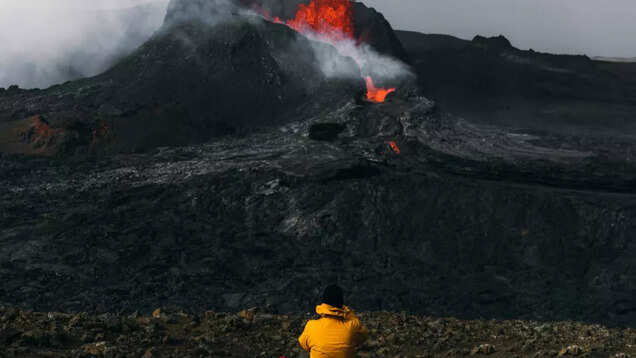Iceland’s volcanic eruptions likely to last for decades, say researchers
Times of IndiaTIMESOFINDIA.COM/ Created : Jun 26, 2024, 17:00 IST
You're Reading

Iceland’s volcanic eruptions likely to last for decades, say researchers 
Uttrakhand overtourism: Video of tourists crowding inside Dehradun’s famous Robber’s Cave goes viral 
Why Germany remains the best option for a multiple-entry Schengen Visa in 2024? 
Noida International Airport likely to start commercial operations by April 2025
Synopsis
This warning comes from an international team of researchers, including experts from the Universities of Oregon and California at San Diego, after studying the series of eruptions that began on the Reykjanes Peninsula in 2021.
This warning comes from an international team of researchers, including experts from the Universities of Oregon and California at San Diego, after studying the series of eruptions that began on the Reykjanes Peninsula in 2021. Read less

The researchers' analysis has revealed that all the recent eruptions have been fed from a shared magma reservoir lying about 6.5 miles beneath the volcano Fagradalsfjall. This magma reservoir is constantly being topped up by material rising from deeper within the Earth's mantle. Given this, the researchers expect more moderately sized eruptions of the kind that have forced the repeated (and sometimes permanent) evacuation of the town of Grindavík and surrounding areas in recent months.
Iceland's volcanic activity is a result of its unique geographic position. The island sits atop the Mid-Atlantic Ridge, where the Eurasian and North American tectonic plates are slowly spreading apart. This, combined with a mantle hot spot beneath the island, causes magma to regularly well up towards the surface. In fact, the entire island of Iceland has been built up by successive volcanic eruptions over the past 20 million years.

Read more: 6 Indian destinations that resemble foreign locales
The researchers analysed earthquake data and lava samples to gain insights into the geological processes driving these recent eruptions. They found evidence of a shared magma reservoir beneath the peninsula, fed by molten rock rising from the mantle hot spot. This suggests the potential for a prolonged period of volcanic activity in the region, possibly lasting for years or even decades.
While the researchers are certain that more eruptions are on the way, the exact pattern and frequency of future events remains uncertain. “Nature is never simple," said volcanologist Ilya Bindeman of the University of Oregon. "We don't know how long and how frequently it will continue for the next ten or even hundred years. A pattern will emerge, but nature always has exceptions and irregularities," he further added.
Read more: World’s oldest languages and their origins
The researchers plan to further investigate the volcanic activity by drilling into the sites to acquire more detailed information on the eruption processes. Iceland's relatively runny, non-explosive magma makes it an ideal ‘natural laboratory’ for scientists to study active volcanoes up close. As study author Valentin Troll noted, "When you witness a volcanic eruption, you can feel that these are the massive forces of nature, and you yourself are very small." While these events may be ordinary on a geological timescale, they can be devastating for the human populations in their path.

Refrain from posting comments that are obscene, defamatory or inflammatory, and do not indulge in personal attacks, name calling or inciting hatred against any community. Help us delete comments that do not follow these guidelines by marking them offensive. Let's work together to keep the conversation civil.
closecomments
Refrain from posting comments that are obscene, defamatory or inflammatory, and do not indulge in personal attacks, name calling or inciting hatred against any community. Help us delete comments that do not follow these guidelines by marking them offensive. Let's work together to keep the conversation civil.
Next story
Uttrakhand overtourism: Video of tourists crowding inside Dehradun’s famous Robber’s Cave goes viral
Visual Stories






Popular Galleries
Trending Stories
In pics: World’s 7 most beautiful metro stations
From monsters to giants; 5 lakes with fascinating myths and legends
Anant and Radhika wedding: 5 destinations where the new ‘Ambani’ couple could head to for their honeymoon?
Anant Ambani Wedding: Traffic restrictions in Mumbai; routes to avoid
Divyanka Tripathi and Vivek Dahiya's passports stolen in Europe. How to protect passports abroad




















Comments (0)